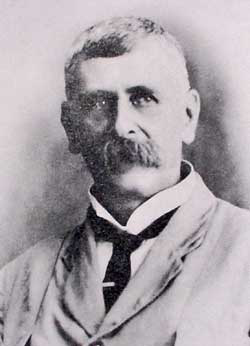Walter Roth
Walter Roth was a notable figure in the field of anthropology and ethnography, particularly known for his work with the Indigenous Australians of Queensland. His contributions to the understanding of Aboriginal cultures and practices have been significant in the field of anthropological studies.
Early Life and Education[edit | edit source]
Walter Edmund Roth was born on April 2, 1861, in London, England. He was the son of Matthias Roth, a Hungarian-born physician, and his wife, Mary Ann Wilson. Roth was educated at Magdalen College School, Oxford, and later attended the University of Edinburgh, where he studied medicine.
Career[edit | edit source]
Roth initially practiced as a physician in England and later in Australia. However, his interest in the cultures of Indigenous Australians led him to transition from medicine to anthropology. In 1898, he was appointed as the first Northern Protector of Aboriginals in Queensland, a position he held until 1904. During his tenure, Roth conducted extensive fieldwork, documenting the customs, languages, and social structures of various Aboriginal groups.
Contributions to Anthropology[edit | edit source]
Roth's work is characterized by his detailed and systematic approach to documenting Aboriginal cultures. He published numerous reports and papers, many of which remain valuable resources for researchers today. Some of his notable works include:
- The Queensland Aborigines (1897)
- Ethnological Studies Among the North-West-Central Queensland Aborigines (1897)
- Superstition, Magic, and Medicine (1903)
Roth's publications provided insights into Aboriginal mythology, rituals, and social organization. His work also highlighted the impact of European colonization on Indigenous communities.
Later Life and Legacy[edit | edit source]
After resigning from his position as Northern Protector, Roth continued his research and eventually moved to British Guiana (now Guyana), where he served as a government medical officer and continued his ethnographic studies. He passed away on April 5, 1933.
Roth's legacy in anthropology is marked by his commitment to preserving the knowledge and traditions of Indigenous peoples. His meticulous documentation has been instrumental in the study of Aboriginal cultures and has influenced subsequent generations of anthropologists.
See Also[edit | edit source]
References[edit | edit source]
External Links[edit | edit source]
Search WikiMD
Ad.Tired of being Overweight? Try W8MD's physician weight loss program.
Semaglutide (Ozempic / Wegovy and Tirzepatide (Mounjaro / Zepbound) available.
Advertise on WikiMD
|
WikiMD's Wellness Encyclopedia |
| Let Food Be Thy Medicine Medicine Thy Food - Hippocrates |
Translate this page: - East Asian
中文,
日本,
한국어,
South Asian
हिन्दी,
தமிழ்,
తెలుగు,
Urdu,
ಕನ್ನಡ,
Southeast Asian
Indonesian,
Vietnamese,
Thai,
မြန်မာဘာသာ,
বাংলা
European
español,
Deutsch,
français,
Greek,
português do Brasil,
polski,
română,
русский,
Nederlands,
norsk,
svenska,
suomi,
Italian
Middle Eastern & African
عربى,
Turkish,
Persian,
Hebrew,
Afrikaans,
isiZulu,
Kiswahili,
Other
Bulgarian,
Hungarian,
Czech,
Swedish,
മലയാളം,
मराठी,
ਪੰਜਾਬੀ,
ગુજરાતી,
Portuguese,
Ukrainian
Medical Disclaimer: WikiMD is not a substitute for professional medical advice. The information on WikiMD is provided as an information resource only, may be incorrect, outdated or misleading, and is not to be used or relied on for any diagnostic or treatment purposes. Please consult your health care provider before making any healthcare decisions or for guidance about a specific medical condition. WikiMD expressly disclaims responsibility, and shall have no liability, for any damages, loss, injury, or liability whatsoever suffered as a result of your reliance on the information contained in this site. By visiting this site you agree to the foregoing terms and conditions, which may from time to time be changed or supplemented by WikiMD. If you do not agree to the foregoing terms and conditions, you should not enter or use this site. See full disclaimer.
Credits:Most images are courtesy of Wikimedia commons, and templates, categories Wikipedia, licensed under CC BY SA or similar.
Contributors: Prab R. Tumpati, MD

